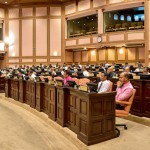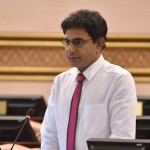The Local Government Authority (LGA) has recommended making councillors part-time with the exception of council presidents and vice presidents.
Speaking at a press conference yesterday, Defence Minister Colonel (Retired) Mohamed Nazim – who chairs the institution tasked with monitoring councils and coordinating with the government – said the LGA has proposed amending the Decentralisation Act to pay part-time councillors an allowance for attending council meetings.
“For example, a teacher or a headmaster level person or someone with higher educational qualifications, they will have the opportunity to contest [council elections]; or for example if it’s a skilled person, a boat builder, they will only have to come for meetings and they’re done after giving their advice and opinion,” Nazim explained.
“The president and vice president will operate the council. Instead, now they have to leave their profession – the teacher, headmaster or boat builder has to give up his job.”
As a consequence, Nazim contended, the councillors’ time was not put to productive use.
“The benefit of [the changes] is that the councillor has to work a very short amount of time and be free to work productively for the island’s development,” he added.
Wage bill
The president of island councils currently receive a monthly salary and allowance of MVR15,000 (US$973) while council members receive MVR11,000 (US$713). The mayor of Malé is paid MVR45,000 (US$2,918) a month.
The president and vice president of councils are elected from among the members by secret ballot.
A total of MVR717 million (US$46 million) was allocated in the 2011 national budget to pay salaries and allowances for local councils, which accounted for 17 percent of the annual wage bill.
Under article 25 of the Decentralisation Act, a five-member council is elected in islands with a population of less than 3,000, a seven-member council for islands with a population between 3,000 and 10,000, and a nine-member council for islands with a population of more than 10,000.
City councils comprise of “an elected member from every electoral constituency of the city” and atoll councils comprises of “elected members from the electoral constituencies within the administrative division.”
The current model of more than 1,000 elected councillors approved in 2010 by the then-opposition majority parliament was branded “economic sabotage” by the Maldivian Democratic Party (MDP) government, which had proposed limiting the number of councillors to “no more than 220.”
The new layer of government introduced with the first local council elections in February 2011 cost the state US$12 million a year with a wage bill of US$220,000 a month.
Finance Minister Abdulla Jihad told parliament’s Budget Review Committee last year that President Abdulla Yameen favoured revising the local government framework to reduce the number of island and atoll councillors.
In November 2013, the incoming administration proposed merging island and atoll councils, with the latter to be composed of a representative from each island of the atoll.
President’s Office Spokesperson Ibrahim Muaz said at the time that “the president’s thinking is not to cut down on the number of councillors. But to elect councilors based on the population of the islands. This is a move to curb state expenditure.”
However, parliament did not move to amend the Decentralisation Act ahead of the local council elections on January 18, which saw 1,100 councillors elected for three-year terms.
Three-year terms
Nazim meanwhile told the press yesterday that the LGA’s recommendations have been shared with the government and the legislature.
While the proposals were intended to reduce the state’s recurrent expenditure – which accounts for over 70 percent of the budget – Nazim said the LGA does not support changing the council’s term from three to five years.
Contending that the legal responsibility of local councils was implementing the government’s policies, Nazim said voters should have the opportunity to change their elected representatives during an ongoing five-year presidential term.
“Citizens get an opportunity to see what kind of results the council produced and the extent to which they upheld the government’s policies,” he said.
Nazim said that LGA Deputy Chair Ahmed Faisal’s public remarks concerning combining the local council and parliamentary elections represented his personal opinion.
The defence minister noted that the Elections Commission has yet to announce official results of the local council elections – held eleven days ago – and that conducting the polls simultaneously would create present difficulties for the commission.
In December, the World Bank warned in a report that the Maldivian economy was at risk due to excessive government spending, with an already excessive wage bill ballooned by 55 percent in 2013.
 (0)Dislikes
(0)Dislikes (0)
(0)





Trying to correct sins of the past, 1000 councillors an overblown civil servants budget, majority of the revenue generated goes into salaries, rather than on development and infrastructure.
Corruption would exist in either model, but here I see abuse of power they would gain in the day job.